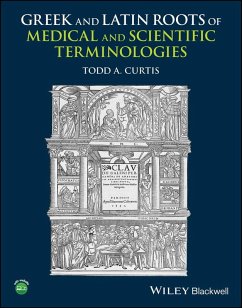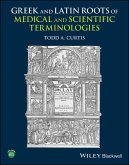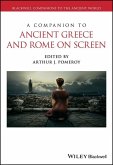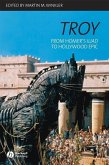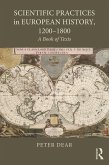Todd A. Curtis
Greek and Latin Roots of Medical and Scientific Terminologies (eBook, PDF)
34,99 €
34,99 €
inkl. MwSt.
Sofort per Download lieferbar

0 °P sammeln
34,99 €
Als Download kaufen

34,99 €
inkl. MwSt.
Sofort per Download lieferbar

0 °P sammeln
Jetzt verschenken
Alle Infos zum eBook verschenken
34,99 €
inkl. MwSt.
Sofort per Download lieferbar
Alle Infos zum eBook verschenken

0 °P sammeln
Todd A. Curtis
Greek and Latin Roots of Medical and Scientific Terminologies (eBook, PDF)
- Format: PDF
- Merkliste
- Auf die Merkliste
- Bewerten Bewerten
- Teilen
- Produkt teilen
- Produkterinnerung
- Produkterinnerung

Bitte loggen Sie sich zunächst in Ihr Kundenkonto ein oder registrieren Sie sich bei
bücher.de, um das eBook-Abo tolino select nutzen zu können.
Hier können Sie sich einloggen
Hier können Sie sich einloggen
Sie sind bereits eingeloggt. Klicken Sie auf 2. tolino select Abo, um fortzufahren.

Bitte loggen Sie sich zunächst in Ihr Kundenkonto ein oder registrieren Sie sich bei bücher.de, um das eBook-Abo tolino select nutzen zu können.
New edition of an established, well-regarded, and evidence-based resource on the subject of renal nursing
Greek and Latin Roots of Medical and Scientific Terminologies explains the Greek and Latin origins of the roots, prefixes, and suffixes of terms used in "med-speak," the specialized language of medicine, science, and healthcare. By presenting medical terms in their historical context, this innovative textbook discusses relevant aspects of ancient Greek and Roman medical theories and practices while teaching students to apply principles of word analysis, synthesis, and pronunciation.…mehr
- Geräte: PC
- ohne Kopierschutz
- eBook Hilfe
- Größe: 28.01MB
Andere Kunden interessierten sich auch für
![Greek and Latin Roots of Medical and Scientific Terminologies (eBook, ePUB) Greek and Latin Roots of Medical and Scientific Terminologies (eBook, ePUB)]() Todd A. CurtisGreek and Latin Roots of Medical and Scientific Terminologies (eBook, ePUB)34,99 €
Todd A. CurtisGreek and Latin Roots of Medical and Scientific Terminologies (eBook, ePUB)34,99 €![A Companion to Ancient Greece and Rome on Screen (eBook, PDF) A Companion to Ancient Greece and Rome on Screen (eBook, PDF)]() A Companion to Ancient Greece and Rome on Screen (eBook, PDF)177,99 €
A Companion to Ancient Greece and Rome on Screen (eBook, PDF)177,99 €![Troy (eBook, PDF) Troy (eBook, PDF)]() Troy (eBook, PDF)31,99 €
Troy (eBook, PDF)31,99 €- -6%11
![The Grass and the Crops (eBook, PDF) The Grass and the Crops (eBook, PDF)]() Bo YinThe Grass and the Crops (eBook, PDF)92,95 €
Bo YinThe Grass and the Crops (eBook, PDF)92,95 € ![Bambi's Jewish Roots and Other Essays on German-Jewish Culture (eBook, PDF) Bambi's Jewish Roots and Other Essays on German-Jewish Culture (eBook, PDF)]() Paul ReitterBambi's Jewish Roots and Other Essays on German-Jewish Culture (eBook, PDF)39,95 €
Paul ReitterBambi's Jewish Roots and Other Essays on German-Jewish Culture (eBook, PDF)39,95 €![Geschichte der Schrift (eBook, PDF) Geschichte der Schrift (eBook, PDF)]() Harald HaarmannGeschichte der Schrift (eBook, PDF)9,99 €
Harald HaarmannGeschichte der Schrift (eBook, PDF)9,99 €![Scientific Practices in European History, 1200-1800 (eBook, PDF) Scientific Practices in European History, 1200-1800 (eBook, PDF)]() Peter DearScientific Practices in European History, 1200-1800 (eBook, PDF)39,95 €
Peter DearScientific Practices in European History, 1200-1800 (eBook, PDF)39,95 €-
-
-
New edition of an established, well-regarded, and evidence-based resource on the subject of renal nursing
Greek and Latin Roots of Medical and Scientific Terminologies explains the Greek and Latin origins of the roots, prefixes, and suffixes of terms used in "med-speak," the specialized language of medicine, science, and healthcare. By presenting medical terms in their historical context, this innovative textbook discusses relevant aspects of ancient Greek and Roman medical theories and practices while teaching students to apply principles of word analysis, synthesis, and pronunciation. Clear and accessible chapters-organized around the modern categories of body systems-contain thorough explanations of ancient medico-scientific culture, etymological notes, images, tables of vocabulary, and a range of exercises designed to increase student comprehension and retention.
Divided into two units, the text first introduces the historical background of ancient Greek medicine and describes the principles of analyzing, constructing, pronouncing, and spelling medical terms. It then discusses Latin and Greek grammar and modern nomenclature in medicine, natural sciences, chemistry, and pharmacy. The second unit teaches the Greek and Latin prefixes, suffixes, roots, eponyms, and loan words relevant to the systems of the body: integumentary, musculoskeletal, circulatory, respiratory, nervous, endocrine, digestive, urinary and reproductive systems. Allowing instructors to teach medical terminology as a true classical civilizations course, this unique volume:
Linking medical terms to the history, literature, and mythology of ancient culture, Greek and Latin Roots of Medical and Scientific Terminologies is an ideal introductory textbook for college-level medical terminology courses, particularly those taught by Classicists.
Greek and Latin Roots of Medical and Scientific Terminologies explains the Greek and Latin origins of the roots, prefixes, and suffixes of terms used in "med-speak," the specialized language of medicine, science, and healthcare. By presenting medical terms in their historical context, this innovative textbook discusses relevant aspects of ancient Greek and Roman medical theories and practices while teaching students to apply principles of word analysis, synthesis, and pronunciation. Clear and accessible chapters-organized around the modern categories of body systems-contain thorough explanations of ancient medico-scientific culture, etymological notes, images, tables of vocabulary, and a range of exercises designed to increase student comprehension and retention.
Divided into two units, the text first introduces the historical background of ancient Greek medicine and describes the principles of analyzing, constructing, pronouncing, and spelling medical terms. It then discusses Latin and Greek grammar and modern nomenclature in medicine, natural sciences, chemistry, and pharmacy. The second unit teaches the Greek and Latin prefixes, suffixes, roots, eponyms, and loan words relevant to the systems of the body: integumentary, musculoskeletal, circulatory, respiratory, nervous, endocrine, digestive, urinary and reproductive systems. Allowing instructors to teach medical terminology as a true classical civilizations course, this unique volume:
- Features the history of ancient Greek medicine and explains the ancient Greek and Latin origins of medical terms and how they came to have their current meaning
- Covers the loan words, eponyms, and the components of basic medico-scientific terms, providing topical tables of commonly used prefixes, suffixes, and roots
- Includes a list of common abbreviations and symbols used in medico-scientific writing
- Teaches abbreviated Latin grammatical paradigms necessary for anatomical taxonomy
- Uses a programmed learning approach that features numerous activities and exercises, including analyzing and constructing terms, interpreting passages from medical notes and scientific journals, and identification and spelling questions
Linking medical terms to the history, literature, and mythology of ancient culture, Greek and Latin Roots of Medical and Scientific Terminologies is an ideal introductory textbook for college-level medical terminology courses, particularly those taught by Classicists.
Dieser Download kann aus rechtlichen Gründen nur mit Rechnungsadresse in D ausgeliefert werden.
Produktdetails
- Produktdetails
- Verlag: For Dummies
- Seitenzahl: 525
- Erscheinungstermin: 19. August 2024
- Englisch
- ISBN-13: 9781118358498
- Artikelnr.: 72556316
- Verlag: For Dummies
- Seitenzahl: 525
- Erscheinungstermin: 19. August 2024
- Englisch
- ISBN-13: 9781118358498
- Artikelnr.: 72556316
- Herstellerkennzeichnung Die Herstellerinformationen sind derzeit nicht verfügbar.
TODD A. CURTIS is a Senior Lecturer in the Department of Classics at The University of Texas, Austin, where he regularly teaches courses on medical terminology and the history of medicine. He is the author of Anatomical Latin: A Programmed Approach to Learning the Grammar and Vocabulary of Anatomical Latin and numerous writings on genre and rhetoric in the Galenic Corpus.
To the Student xi
To the Instructor xiv
Acknowledgments xvi
About the Companion Website xvii
Unit I Basics of Medical and Scientific Terminology 1
1 The Historical Origins of Greek and Latin in Medical Terminology 3
Historical Origins of Greek in Medical Terminology 3
Historical Origins of Latin in Medical Terminology 5
Asclepius and the Symbols of Medicine 6
Famous Ancient Greek Physicians 9
Hippocrates 11
Galen 11
Some Suggested Readings 12
2 Greek and Latin Word Elements in Medical Terminology 13
Lessons from History: Aphorism 1.1 and Etymology 13
Some Suggested Readings 14
Etymological Terms 15
Eponym 15
Loan Word 15
Derivative 16
Compound Word 16
Inflection 16
Root 17
Prefix 18
Suffix 18
Combining Vowel and Combing Form 19
Usage of Combining Vowels 19
Elision 19
Assimilation 20
Vowel Gradation (Ablaut) 20
Semantics 22
Etymology and Semantics 22
Meaning via Word Analysis 22
Word Elements with Multiple Meanings 23
Synonyms 23
Homographs 24
Literal Meaning Versus Technical Definition 24
Spelling 24
The Greek Alphabet 24
Transliteration 25
Alternate Spellings of Greek Words 25
Alternate Spellings of Latin Words 26
Pluralization 27
Common Classical Plural Forms in Medico-Scientific English 27
Pronunciation 28
Phonetic Spelling 28
Guidelines for the Pronunciation of Medico-Scientific Terms 29
Vowels 29
Final Vowel 29
Diphthongs 30
Consonants 30
Consonant Clusters 31
Syllables 31
Stress 31
Pronunciation of Word Elements 32
Vocabulary 32
Prefixes 32
Greek Prefixes 33
Latin Prefixes 34
Suffixes 36
Greek Suffixes 37
Latin Suffixes 37
3 Anatomical Terminology 40
Lessons from History: Alexandrian Origins of Human Dissection and the Rise
of Anatomical Latin 40
Some Suggested Readings 43
Latin Anatomical Nouns 43
Inflection 43
Case 43
Nominative Case 43
Genitive Case 43
Number 44
Gender 45
Declensions 45
Using Latin Dictionaries 46
Latin Nouns for General Parts of the Human Body 49
Greek Anatomical Nouns 57
Declensions 57
Greek Nouns in Anatomical Latin 58
Latin Anatomical Adjectives 62
Types of Latin Adjectives 62
1st and 2nd Declension-Type Adjectives 63
Third Declension-Type Adjectives 64
Comparative Adjectives 64
Creation of Latin Anatomical Adjectives 65
Latin Adjectives for Positions and Planes of the Body 65
4 Diagnostic and Therapeutic Terminology 70
Lessons from History: Celsus' Description of Greek Medicine 70
Some Suggested Readings 74
Vocabulary 75
Lessons from History: Celsus on the Preservation of Health 76
Some Suggested Readings 78
Vocabulary 78
Lessons from History: Celsus and the Diagnosis of Disease 80
Some Suggested Readings 82
Vocabulary 83
Lessons from History: Celsus and Ancient Greek Surgery 90
Some Suggested Readings 92
Surgical Compound Suffixes 92
Surgical Word Elements 94
Lessons from History: Hippocratic Epidemics and Progress Notes 95
Some Suggested Readings 96
SOAP Notes 96
5 Chemical and Pharmacological Terminology 98
Lessons from History: The Greek Alphabet and Modern Scientific Notation 98
Some Suggested Readings 99
Roman Numerals 101
Word Elements for Greek and Latin Numbers 101
Greek Cardinal Numbers 102
Greek Ordinal Numbers 103
Adverbs and Numbers 103
Latin Cardinal Numbers 104
Latin Ordinal Numbers 105
Lessons from History: The Four Classical Elements and the Elements of
Chemistry 106
Some Suggested Readings 109
Etymological Explanations: Chemical Elements 109
Etymologies of Chemical Elements Derived from Greek 109
Etymologies of Chemical Elements Derived from Latin 112
Greek Mythological Characters and the Etymology of Modern Elements 112
Commonly Used Greek and Latin Word Elements in Chemical Terminology 115
Lessons from History: Ancient Greek Drugs and Modern Pharmaceutical
Terminology 118
Some Suggested Readings 121
Etymological Explanations: The Abbreviations and Symbols Used in
Prescriptions 121
Unit II Body Systems 125
6 Integumentary System 127
Lessons from History: Ancient and Modern Concepts of Skin and Its
Appendages 127
Some Suggested Readings 130
Etymological Explanations: Common Terms and Word Elements for the Anatomy
of the Integumentary System 130
Lessons from History: Hippocrates' On Ulcers and Dermatology 135
Some Suggested Readings 137
Etymological Explanations: Lesions 137
Lessons from History: Skin Color in Ancient Greek Medicine and Science 141
Some Suggested Readings 143
Vocabulary 143
Lessons from History: Terms for Skin Diseases in Ancient Greek and Modern
Medicine 144
Some Suggested Readings 148
Lessons from History: Cosmetics and Plastic Surgery in Ancient Greek
Medicine 150
Some Suggested Readings 152
Etymological Explanations: Grafts 152
Vocabulary 153
7 Musculoskeletal System 154
Etymological Explanations: Common Terms and Word Elements for the General
Parts of the Musculoskeletal System 154
Etymological Explanations: Greek and Latin Roots for the Parts of Bones 159
Lessons from History: Galen's Bones for Beginners and the Teaching of
Anatomy 161
Some Suggested Readings 164
Etymological Explanations: Greek and Latin Roots for the Skeletal Bones 164
Etymological Explanations: Greek and Latin Roots for the Parts and
Movements of Muscles 174
Lessons from History: Muscles in Ancient Greek Medicine 177
Some Suggested Readings 182
Lessons from History: History of Orthopedics and Hippocratic Medicine 184
Some Suggested Readings 188
Etymological Explanations: Greek and Latin Roots for Orthopedic Terms 188
8 Cardiovascular System, Blood, and Lymph 197
Lessons from History: Galen's Theory of Blood Flow and the Circulation of
Blood 197
Some Suggested Readings 200
Etymological Explanations: Common Terms and Word Elements for the Anatomy
of the Cardiovascular System 200
Lessons from History: The Pulse and the Diagnosis of Disease 209
Some Suggested Readings 212
Etymological Explanations: Common Terms and Word Elements for the
Physiology of Cardiovascular System 212
Lessons from History: Changing Concepts of Blood 219
Some Suggested Readings 223
Etymological Explanations: Common Terms and Word Elements for Blood and
Lymph 224
Etymological Explanations: Pathologies of Blood and Lymph 230
9 Respiratory System 236
Lessons from History: Aristotle's Theory of Respiration 236
Suggested Readings 238
Etymological Explanations: Common Terms and Word Elements for the Anatomy
of Respiratory System 238
Lessons from History: Ancient and Modern Notions of Air 248
Suggested Readings 249
Etymological Explanations: Respiration and Air 250
Lessons from History: Hippocratic Diagnosis and Treatment of Empyema 253
Suggested Readings 255
Etymological Explanations: Pathologies of the Respiratory System 255
10 Nervous System and Psychology 261
Lessons from History: Mental Faculties and the Ventricles Brain in Ancient
Philosophy and Medicine 261
Suggested Readings 266
Etymological Explanations: Common Terms and Word Elements for the Anatomy
of the Nervous System 267
Etymological Explanations: Common Terms and Word Elements for the
Physiology and Pathophysiology of the Nervous System 280
Lessons from History: Mental Illness in Ancient Greek Medicine 291
Suggested Readings 294
Etymological Explanations: Common Terms and Word Elements for Psychological
Terms 294
11 Eye, Ear, and Special Senses 301
Lessons from History: Aristotle's Hierarchy of Senses 301
Some Suggested Readings 304
Etymological Explanations: Common Terms and Word Elements for the Five
Senses 304
Etymological Explanations: Common Terms and Word Elements for the Anatomy
of the Eye 306
Etymological Explanations: Common Terms and Word Elements for the
Pathologies of the Eye 313
Etymological Explanations: Common Terms and Word Elements for the Anatomy
of the Ear 320
Etymological Explanations: Common Terms and Word Elements for the
Pathologies of the Ear 325
12 Endocrine System 329
Lessons from History: Paradigm, Perception, and the Pineal Gland 329
Some Suggested Readings 333
Etymological Explanations: Common Terms and Word Elements for the Anatomy
and Physiology of Glands 333
Types of Glands and Secretions 333
Endocrine Glands 335
Etymological Explanations: Common Terms and Word Elements for Hormones 339
Etymological Explanations: Common Terms and Word Elements for the
Physiology and Pathophysiology of the Endocrine System 343
13 Gastrointestinal System 347
Lessons from History: The Gastrointestinal System and Figures of Speech 347
Some Suggested Readings 349
Etymological Explanations: Common Terms and Word Elements for the Anatomy
of the Gastrointestinal System 349
Lessons from History: Digestion and Diet in Hippocratic and Modern Medicine
362
Some Suggested Readings 365
Etymological Explanations: Common Terms and Word Elements for Aliment,
Digestion, and Defecation 366
Etymological Explanations: Common Terms and Word Elements for Pathologies
of the Gastrointestinal System 370
14 Urinary System 381
Lessons from History: Ancient Greek Medical Explanations of the Physiology
of the Urinary System 381
Some Suggested Readings 382
Etymological Explanations: Common Terms and Word Elements for the Anatomy
of the Urinary System 383
Lessons from History: Uroscopy and Urinalysis 387
Some Suggested Readings 390
Etymological Explanations: Common Terms and Word Elements for Urine and
Urination 390
Lessons from History: Lithotomy and the Hippocratic Oath 394
Some Suggested Readings 397
15 Male and Female Reproductive Systems 401
Lessons from History: Ancient Greek and Roman Conceptions of the Penis 401
Some Suggested Readings 406
Etymological Explanations: Common Terms and Word Elements for the Male
Reproductive System 406
Lessons from History: Society and Ancient Greek Medicine's Interpretation
of the Female Genitalia 415
Some Suggested Readings 420
Etymological Explanations: Common Terms and Word Elements for the Female
Reproductive System 420
Lessons from History: The Formation of the Fetus, Abortion, and Birth
Defects in Ancient Greek Medicine and Society 429
Some Suggested Readings 432
Etymological Explanations: Obstetrics 432
Appendix A 439
Appendix B 504
To the Instructor xiv
Acknowledgments xvi
About the Companion Website xvii
Unit I Basics of Medical and Scientific Terminology 1
1 The Historical Origins of Greek and Latin in Medical Terminology 3
Historical Origins of Greek in Medical Terminology 3
Historical Origins of Latin in Medical Terminology 5
Asclepius and the Symbols of Medicine 6
Famous Ancient Greek Physicians 9
Hippocrates 11
Galen 11
Some Suggested Readings 12
2 Greek and Latin Word Elements in Medical Terminology 13
Lessons from History: Aphorism 1.1 and Etymology 13
Some Suggested Readings 14
Etymological Terms 15
Eponym 15
Loan Word 15
Derivative 16
Compound Word 16
Inflection 16
Root 17
Prefix 18
Suffix 18
Combining Vowel and Combing Form 19
Usage of Combining Vowels 19
Elision 19
Assimilation 20
Vowel Gradation (Ablaut) 20
Semantics 22
Etymology and Semantics 22
Meaning via Word Analysis 22
Word Elements with Multiple Meanings 23
Synonyms 23
Homographs 24
Literal Meaning Versus Technical Definition 24
Spelling 24
The Greek Alphabet 24
Transliteration 25
Alternate Spellings of Greek Words 25
Alternate Spellings of Latin Words 26
Pluralization 27
Common Classical Plural Forms in Medico-Scientific English 27
Pronunciation 28
Phonetic Spelling 28
Guidelines for the Pronunciation of Medico-Scientific Terms 29
Vowels 29
Final Vowel 29
Diphthongs 30
Consonants 30
Consonant Clusters 31
Syllables 31
Stress 31
Pronunciation of Word Elements 32
Vocabulary 32
Prefixes 32
Greek Prefixes 33
Latin Prefixes 34
Suffixes 36
Greek Suffixes 37
Latin Suffixes 37
3 Anatomical Terminology 40
Lessons from History: Alexandrian Origins of Human Dissection and the Rise
of Anatomical Latin 40
Some Suggested Readings 43
Latin Anatomical Nouns 43
Inflection 43
Case 43
Nominative Case 43
Genitive Case 43
Number 44
Gender 45
Declensions 45
Using Latin Dictionaries 46
Latin Nouns for General Parts of the Human Body 49
Greek Anatomical Nouns 57
Declensions 57
Greek Nouns in Anatomical Latin 58
Latin Anatomical Adjectives 62
Types of Latin Adjectives 62
1st and 2nd Declension-Type Adjectives 63
Third Declension-Type Adjectives 64
Comparative Adjectives 64
Creation of Latin Anatomical Adjectives 65
Latin Adjectives for Positions and Planes of the Body 65
4 Diagnostic and Therapeutic Terminology 70
Lessons from History: Celsus' Description of Greek Medicine 70
Some Suggested Readings 74
Vocabulary 75
Lessons from History: Celsus on the Preservation of Health 76
Some Suggested Readings 78
Vocabulary 78
Lessons from History: Celsus and the Diagnosis of Disease 80
Some Suggested Readings 82
Vocabulary 83
Lessons from History: Celsus and Ancient Greek Surgery 90
Some Suggested Readings 92
Surgical Compound Suffixes 92
Surgical Word Elements 94
Lessons from History: Hippocratic Epidemics and Progress Notes 95
Some Suggested Readings 96
SOAP Notes 96
5 Chemical and Pharmacological Terminology 98
Lessons from History: The Greek Alphabet and Modern Scientific Notation 98
Some Suggested Readings 99
Roman Numerals 101
Word Elements for Greek and Latin Numbers 101
Greek Cardinal Numbers 102
Greek Ordinal Numbers 103
Adverbs and Numbers 103
Latin Cardinal Numbers 104
Latin Ordinal Numbers 105
Lessons from History: The Four Classical Elements and the Elements of
Chemistry 106
Some Suggested Readings 109
Etymological Explanations: Chemical Elements 109
Etymologies of Chemical Elements Derived from Greek 109
Etymologies of Chemical Elements Derived from Latin 112
Greek Mythological Characters and the Etymology of Modern Elements 112
Commonly Used Greek and Latin Word Elements in Chemical Terminology 115
Lessons from History: Ancient Greek Drugs and Modern Pharmaceutical
Terminology 118
Some Suggested Readings 121
Etymological Explanations: The Abbreviations and Symbols Used in
Prescriptions 121
Unit II Body Systems 125
6 Integumentary System 127
Lessons from History: Ancient and Modern Concepts of Skin and Its
Appendages 127
Some Suggested Readings 130
Etymological Explanations: Common Terms and Word Elements for the Anatomy
of the Integumentary System 130
Lessons from History: Hippocrates' On Ulcers and Dermatology 135
Some Suggested Readings 137
Etymological Explanations: Lesions 137
Lessons from History: Skin Color in Ancient Greek Medicine and Science 141
Some Suggested Readings 143
Vocabulary 143
Lessons from History: Terms for Skin Diseases in Ancient Greek and Modern
Medicine 144
Some Suggested Readings 148
Lessons from History: Cosmetics and Plastic Surgery in Ancient Greek
Medicine 150
Some Suggested Readings 152
Etymological Explanations: Grafts 152
Vocabulary 153
7 Musculoskeletal System 154
Etymological Explanations: Common Terms and Word Elements for the General
Parts of the Musculoskeletal System 154
Etymological Explanations: Greek and Latin Roots for the Parts of Bones 159
Lessons from History: Galen's Bones for Beginners and the Teaching of
Anatomy 161
Some Suggested Readings 164
Etymological Explanations: Greek and Latin Roots for the Skeletal Bones 164
Etymological Explanations: Greek and Latin Roots for the Parts and
Movements of Muscles 174
Lessons from History: Muscles in Ancient Greek Medicine 177
Some Suggested Readings 182
Lessons from History: History of Orthopedics and Hippocratic Medicine 184
Some Suggested Readings 188
Etymological Explanations: Greek and Latin Roots for Orthopedic Terms 188
8 Cardiovascular System, Blood, and Lymph 197
Lessons from History: Galen's Theory of Blood Flow and the Circulation of
Blood 197
Some Suggested Readings 200
Etymological Explanations: Common Terms and Word Elements for the Anatomy
of the Cardiovascular System 200
Lessons from History: The Pulse and the Diagnosis of Disease 209
Some Suggested Readings 212
Etymological Explanations: Common Terms and Word Elements for the
Physiology of Cardiovascular System 212
Lessons from History: Changing Concepts of Blood 219
Some Suggested Readings 223
Etymological Explanations: Common Terms and Word Elements for Blood and
Lymph 224
Etymological Explanations: Pathologies of Blood and Lymph 230
9 Respiratory System 236
Lessons from History: Aristotle's Theory of Respiration 236
Suggested Readings 238
Etymological Explanations: Common Terms and Word Elements for the Anatomy
of Respiratory System 238
Lessons from History: Ancient and Modern Notions of Air 248
Suggested Readings 249
Etymological Explanations: Respiration and Air 250
Lessons from History: Hippocratic Diagnosis and Treatment of Empyema 253
Suggested Readings 255
Etymological Explanations: Pathologies of the Respiratory System 255
10 Nervous System and Psychology 261
Lessons from History: Mental Faculties and the Ventricles Brain in Ancient
Philosophy and Medicine 261
Suggested Readings 266
Etymological Explanations: Common Terms and Word Elements for the Anatomy
of the Nervous System 267
Etymological Explanations: Common Terms and Word Elements for the
Physiology and Pathophysiology of the Nervous System 280
Lessons from History: Mental Illness in Ancient Greek Medicine 291
Suggested Readings 294
Etymological Explanations: Common Terms and Word Elements for Psychological
Terms 294
11 Eye, Ear, and Special Senses 301
Lessons from History: Aristotle's Hierarchy of Senses 301
Some Suggested Readings 304
Etymological Explanations: Common Terms and Word Elements for the Five
Senses 304
Etymological Explanations: Common Terms and Word Elements for the Anatomy
of the Eye 306
Etymological Explanations: Common Terms and Word Elements for the
Pathologies of the Eye 313
Etymological Explanations: Common Terms and Word Elements for the Anatomy
of the Ear 320
Etymological Explanations: Common Terms and Word Elements for the
Pathologies of the Ear 325
12 Endocrine System 329
Lessons from History: Paradigm, Perception, and the Pineal Gland 329
Some Suggested Readings 333
Etymological Explanations: Common Terms and Word Elements for the Anatomy
and Physiology of Glands 333
Types of Glands and Secretions 333
Endocrine Glands 335
Etymological Explanations: Common Terms and Word Elements for Hormones 339
Etymological Explanations: Common Terms and Word Elements for the
Physiology and Pathophysiology of the Endocrine System 343
13 Gastrointestinal System 347
Lessons from History: The Gastrointestinal System and Figures of Speech 347
Some Suggested Readings 349
Etymological Explanations: Common Terms and Word Elements for the Anatomy
of the Gastrointestinal System 349
Lessons from History: Digestion and Diet in Hippocratic and Modern Medicine
362
Some Suggested Readings 365
Etymological Explanations: Common Terms and Word Elements for Aliment,
Digestion, and Defecation 366
Etymological Explanations: Common Terms and Word Elements for Pathologies
of the Gastrointestinal System 370
14 Urinary System 381
Lessons from History: Ancient Greek Medical Explanations of the Physiology
of the Urinary System 381
Some Suggested Readings 382
Etymological Explanations: Common Terms and Word Elements for the Anatomy
of the Urinary System 383
Lessons from History: Uroscopy and Urinalysis 387
Some Suggested Readings 390
Etymological Explanations: Common Terms and Word Elements for Urine and
Urination 390
Lessons from History: Lithotomy and the Hippocratic Oath 394
Some Suggested Readings 397
15 Male and Female Reproductive Systems 401
Lessons from History: Ancient Greek and Roman Conceptions of the Penis 401
Some Suggested Readings 406
Etymological Explanations: Common Terms and Word Elements for the Male
Reproductive System 406
Lessons from History: Society and Ancient Greek Medicine's Interpretation
of the Female Genitalia 415
Some Suggested Readings 420
Etymological Explanations: Common Terms and Word Elements for the Female
Reproductive System 420
Lessons from History: The Formation of the Fetus, Abortion, and Birth
Defects in Ancient Greek Medicine and Society 429
Some Suggested Readings 432
Etymological Explanations: Obstetrics 432
Appendix A 439
Appendix B 504
To the Student xi
To the Instructor xiv
Acknowledgments xvi
About the Companion Website xvii
Unit I Basics of Medical and Scientific Terminology 1
1 The Historical Origins of Greek and Latin in Medical Terminology 3
Historical Origins of Greek in Medical Terminology 3
Historical Origins of Latin in Medical Terminology 5
Asclepius and the Symbols of Medicine 6
Famous Ancient Greek Physicians 9
Hippocrates 11
Galen 11
Some Suggested Readings 12
2 Greek and Latin Word Elements in Medical Terminology 13
Lessons from History: Aphorism 1.1 and Etymology 13
Some Suggested Readings 14
Etymological Terms 15
Eponym 15
Loan Word 15
Derivative 16
Compound Word 16
Inflection 16
Root 17
Prefix 18
Suffix 18
Combining Vowel and Combing Form 19
Usage of Combining Vowels 19
Elision 19
Assimilation 20
Vowel Gradation (Ablaut) 20
Semantics 22
Etymology and Semantics 22
Meaning via Word Analysis 22
Word Elements with Multiple Meanings 23
Synonyms 23
Homographs 24
Literal Meaning Versus Technical Definition 24
Spelling 24
The Greek Alphabet 24
Transliteration 25
Alternate Spellings of Greek Words 25
Alternate Spellings of Latin Words 26
Pluralization 27
Common Classical Plural Forms in Medico-Scientific English 27
Pronunciation 28
Phonetic Spelling 28
Guidelines for the Pronunciation of Medico-Scientific Terms 29
Vowels 29
Final Vowel 29
Diphthongs 30
Consonants 30
Consonant Clusters 31
Syllables 31
Stress 31
Pronunciation of Word Elements 32
Vocabulary 32
Prefixes 32
Greek Prefixes 33
Latin Prefixes 34
Suffixes 36
Greek Suffixes 37
Latin Suffixes 37
3 Anatomical Terminology 40
Lessons from History: Alexandrian Origins of Human Dissection and the Rise
of Anatomical Latin 40
Some Suggested Readings 43
Latin Anatomical Nouns 43
Inflection 43
Case 43
Nominative Case 43
Genitive Case 43
Number 44
Gender 45
Declensions 45
Using Latin Dictionaries 46
Latin Nouns for General Parts of the Human Body 49
Greek Anatomical Nouns 57
Declensions 57
Greek Nouns in Anatomical Latin 58
Latin Anatomical Adjectives 62
Types of Latin Adjectives 62
1st and 2nd Declension-Type Adjectives 63
Third Declension-Type Adjectives 64
Comparative Adjectives 64
Creation of Latin Anatomical Adjectives 65
Latin Adjectives for Positions and Planes of the Body 65
4 Diagnostic and Therapeutic Terminology 70
Lessons from History: Celsus' Description of Greek Medicine 70
Some Suggested Readings 74
Vocabulary 75
Lessons from History: Celsus on the Preservation of Health 76
Some Suggested Readings 78
Vocabulary 78
Lessons from History: Celsus and the Diagnosis of Disease 80
Some Suggested Readings 82
Vocabulary 83
Lessons from History: Celsus and Ancient Greek Surgery 90
Some Suggested Readings 92
Surgical Compound Suffixes 92
Surgical Word Elements 94
Lessons from History: Hippocratic Epidemics and Progress Notes 95
Some Suggested Readings 96
SOAP Notes 96
5 Chemical and Pharmacological Terminology 98
Lessons from History: The Greek Alphabet and Modern Scientific Notation 98
Some Suggested Readings 99
Roman Numerals 101
Word Elements for Greek and Latin Numbers 101
Greek Cardinal Numbers 102
Greek Ordinal Numbers 103
Adverbs and Numbers 103
Latin Cardinal Numbers 104
Latin Ordinal Numbers 105
Lessons from History: The Four Classical Elements and the Elements of
Chemistry 106
Some Suggested Readings 109
Etymological Explanations: Chemical Elements 109
Etymologies of Chemical Elements Derived from Greek 109
Etymologies of Chemical Elements Derived from Latin 112
Greek Mythological Characters and the Etymology of Modern Elements 112
Commonly Used Greek and Latin Word Elements in Chemical Terminology 115
Lessons from History: Ancient Greek Drugs and Modern Pharmaceutical
Terminology 118
Some Suggested Readings 121
Etymological Explanations: The Abbreviations and Symbols Used in
Prescriptions 121
Unit II Body Systems 125
6 Integumentary System 127
Lessons from History: Ancient and Modern Concepts of Skin and Its
Appendages 127
Some Suggested Readings 130
Etymological Explanations: Common Terms and Word Elements for the Anatomy
of the Integumentary System 130
Lessons from History: Hippocrates' On Ulcers and Dermatology 135
Some Suggested Readings 137
Etymological Explanations: Lesions 137
Lessons from History: Skin Color in Ancient Greek Medicine and Science 141
Some Suggested Readings 143
Vocabulary 143
Lessons from History: Terms for Skin Diseases in Ancient Greek and Modern
Medicine 144
Some Suggested Readings 148
Lessons from History: Cosmetics and Plastic Surgery in Ancient Greek
Medicine 150
Some Suggested Readings 152
Etymological Explanations: Grafts 152
Vocabulary 153
7 Musculoskeletal System 154
Etymological Explanations: Common Terms and Word Elements for the General
Parts of the Musculoskeletal System 154
Etymological Explanations: Greek and Latin Roots for the Parts of Bones 159
Lessons from History: Galen's Bones for Beginners and the Teaching of
Anatomy 161
Some Suggested Readings 164
Etymological Explanations: Greek and Latin Roots for the Skeletal Bones 164
Etymological Explanations: Greek and Latin Roots for the Parts and
Movements of Muscles 174
Lessons from History: Muscles in Ancient Greek Medicine 177
Some Suggested Readings 182
Lessons from History: History of Orthopedics and Hippocratic Medicine 184
Some Suggested Readings 188
Etymological Explanations: Greek and Latin Roots for Orthopedic Terms 188
8 Cardiovascular System, Blood, and Lymph 197
Lessons from History: Galen's Theory of Blood Flow and the Circulation of
Blood 197
Some Suggested Readings 200
Etymological Explanations: Common Terms and Word Elements for the Anatomy
of the Cardiovascular System 200
Lessons from History: The Pulse and the Diagnosis of Disease 209
Some Suggested Readings 212
Etymological Explanations: Common Terms and Word Elements for the
Physiology of Cardiovascular System 212
Lessons from History: Changing Concepts of Blood 219
Some Suggested Readings 223
Etymological Explanations: Common Terms and Word Elements for Blood and
Lymph 224
Etymological Explanations: Pathologies of Blood and Lymph 230
9 Respiratory System 236
Lessons from History: Aristotle's Theory of Respiration 236
Suggested Readings 238
Etymological Explanations: Common Terms and Word Elements for the Anatomy
of Respiratory System 238
Lessons from History: Ancient and Modern Notions of Air 248
Suggested Readings 249
Etymological Explanations: Respiration and Air 250
Lessons from History: Hippocratic Diagnosis and Treatment of Empyema 253
Suggested Readings 255
Etymological Explanations: Pathologies of the Respiratory System 255
10 Nervous System and Psychology 261
Lessons from History: Mental Faculties and the Ventricles Brain in Ancient
Philosophy and Medicine 261
Suggested Readings 266
Etymological Explanations: Common Terms and Word Elements for the Anatomy
of the Nervous System 267
Etymological Explanations: Common Terms and Word Elements for the
Physiology and Pathophysiology of the Nervous System 280
Lessons from History: Mental Illness in Ancient Greek Medicine 291
Suggested Readings 294
Etymological Explanations: Common Terms and Word Elements for Psychological
Terms 294
11 Eye, Ear, and Special Senses 301
Lessons from History: Aristotle's Hierarchy of Senses 301
Some Suggested Readings 304
Etymological Explanations: Common Terms and Word Elements for the Five
Senses 304
Etymological Explanations: Common Terms and Word Elements for the Anatomy
of the Eye 306
Etymological Explanations: Common Terms and Word Elements for the
Pathologies of the Eye 313
Etymological Explanations: Common Terms and Word Elements for the Anatomy
of the Ear 320
Etymological Explanations: Common Terms and Word Elements for the
Pathologies of the Ear 325
12 Endocrine System 329
Lessons from History: Paradigm, Perception, and the Pineal Gland 329
Some Suggested Readings 333
Etymological Explanations: Common Terms and Word Elements for the Anatomy
and Physiology of Glands 333
Types of Glands and Secretions 333
Endocrine Glands 335
Etymological Explanations: Common Terms and Word Elements for Hormones 339
Etymological Explanations: Common Terms and Word Elements for the
Physiology and Pathophysiology of the Endocrine System 343
13 Gastrointestinal System 347
Lessons from History: The Gastrointestinal System and Figures of Speech 347
Some Suggested Readings 349
Etymological Explanations: Common Terms and Word Elements for the Anatomy
of the Gastrointestinal System 349
Lessons from History: Digestion and Diet in Hippocratic and Modern Medicine
362
Some Suggested Readings 365
Etymological Explanations: Common Terms and Word Elements for Aliment,
Digestion, and Defecation 366
Etymological Explanations: Common Terms and Word Elements for Pathologies
of the Gastrointestinal System 370
14 Urinary System 381
Lessons from History: Ancient Greek Medical Explanations of the Physiology
of the Urinary System 381
Some Suggested Readings 382
Etymological Explanations: Common Terms and Word Elements for the Anatomy
of the Urinary System 383
Lessons from History: Uroscopy and Urinalysis 387
Some Suggested Readings 390
Etymological Explanations: Common Terms and Word Elements for Urine and
Urination 390
Lessons from History: Lithotomy and the Hippocratic Oath 394
Some Suggested Readings 397
15 Male and Female Reproductive Systems 401
Lessons from History: Ancient Greek and Roman Conceptions of the Penis 401
Some Suggested Readings 406
Etymological Explanations: Common Terms and Word Elements for the Male
Reproductive System 406
Lessons from History: Society and Ancient Greek Medicine's Interpretation
of the Female Genitalia 415
Some Suggested Readings 420
Etymological Explanations: Common Terms and Word Elements for the Female
Reproductive System 420
Lessons from History: The Formation of the Fetus, Abortion, and Birth
Defects in Ancient Greek Medicine and Society 429
Some Suggested Readings 432
Etymological Explanations: Obstetrics 432
Appendix A 439
Appendix B 504
To the Instructor xiv
Acknowledgments xvi
About the Companion Website xvii
Unit I Basics of Medical and Scientific Terminology 1
1 The Historical Origins of Greek and Latin in Medical Terminology 3
Historical Origins of Greek in Medical Terminology 3
Historical Origins of Latin in Medical Terminology 5
Asclepius and the Symbols of Medicine 6
Famous Ancient Greek Physicians 9
Hippocrates 11
Galen 11
Some Suggested Readings 12
2 Greek and Latin Word Elements in Medical Terminology 13
Lessons from History: Aphorism 1.1 and Etymology 13
Some Suggested Readings 14
Etymological Terms 15
Eponym 15
Loan Word 15
Derivative 16
Compound Word 16
Inflection 16
Root 17
Prefix 18
Suffix 18
Combining Vowel and Combing Form 19
Usage of Combining Vowels 19
Elision 19
Assimilation 20
Vowel Gradation (Ablaut) 20
Semantics 22
Etymology and Semantics 22
Meaning via Word Analysis 22
Word Elements with Multiple Meanings 23
Synonyms 23
Homographs 24
Literal Meaning Versus Technical Definition 24
Spelling 24
The Greek Alphabet 24
Transliteration 25
Alternate Spellings of Greek Words 25
Alternate Spellings of Latin Words 26
Pluralization 27
Common Classical Plural Forms in Medico-Scientific English 27
Pronunciation 28
Phonetic Spelling 28
Guidelines for the Pronunciation of Medico-Scientific Terms 29
Vowels 29
Final Vowel 29
Diphthongs 30
Consonants 30
Consonant Clusters 31
Syllables 31
Stress 31
Pronunciation of Word Elements 32
Vocabulary 32
Prefixes 32
Greek Prefixes 33
Latin Prefixes 34
Suffixes 36
Greek Suffixes 37
Latin Suffixes 37
3 Anatomical Terminology 40
Lessons from History: Alexandrian Origins of Human Dissection and the Rise
of Anatomical Latin 40
Some Suggested Readings 43
Latin Anatomical Nouns 43
Inflection 43
Case 43
Nominative Case 43
Genitive Case 43
Number 44
Gender 45
Declensions 45
Using Latin Dictionaries 46
Latin Nouns for General Parts of the Human Body 49
Greek Anatomical Nouns 57
Declensions 57
Greek Nouns in Anatomical Latin 58
Latin Anatomical Adjectives 62
Types of Latin Adjectives 62
1st and 2nd Declension-Type Adjectives 63
Third Declension-Type Adjectives 64
Comparative Adjectives 64
Creation of Latin Anatomical Adjectives 65
Latin Adjectives for Positions and Planes of the Body 65
4 Diagnostic and Therapeutic Terminology 70
Lessons from History: Celsus' Description of Greek Medicine 70
Some Suggested Readings 74
Vocabulary 75
Lessons from History: Celsus on the Preservation of Health 76
Some Suggested Readings 78
Vocabulary 78
Lessons from History: Celsus and the Diagnosis of Disease 80
Some Suggested Readings 82
Vocabulary 83
Lessons from History: Celsus and Ancient Greek Surgery 90
Some Suggested Readings 92
Surgical Compound Suffixes 92
Surgical Word Elements 94
Lessons from History: Hippocratic Epidemics and Progress Notes 95
Some Suggested Readings 96
SOAP Notes 96
5 Chemical and Pharmacological Terminology 98
Lessons from History: The Greek Alphabet and Modern Scientific Notation 98
Some Suggested Readings 99
Roman Numerals 101
Word Elements for Greek and Latin Numbers 101
Greek Cardinal Numbers 102
Greek Ordinal Numbers 103
Adverbs and Numbers 103
Latin Cardinal Numbers 104
Latin Ordinal Numbers 105
Lessons from History: The Four Classical Elements and the Elements of
Chemistry 106
Some Suggested Readings 109
Etymological Explanations: Chemical Elements 109
Etymologies of Chemical Elements Derived from Greek 109
Etymologies of Chemical Elements Derived from Latin 112
Greek Mythological Characters and the Etymology of Modern Elements 112
Commonly Used Greek and Latin Word Elements in Chemical Terminology 115
Lessons from History: Ancient Greek Drugs and Modern Pharmaceutical
Terminology 118
Some Suggested Readings 121
Etymological Explanations: The Abbreviations and Symbols Used in
Prescriptions 121
Unit II Body Systems 125
6 Integumentary System 127
Lessons from History: Ancient and Modern Concepts of Skin and Its
Appendages 127
Some Suggested Readings 130
Etymological Explanations: Common Terms and Word Elements for the Anatomy
of the Integumentary System 130
Lessons from History: Hippocrates' On Ulcers and Dermatology 135
Some Suggested Readings 137
Etymological Explanations: Lesions 137
Lessons from History: Skin Color in Ancient Greek Medicine and Science 141
Some Suggested Readings 143
Vocabulary 143
Lessons from History: Terms for Skin Diseases in Ancient Greek and Modern
Medicine 144
Some Suggested Readings 148
Lessons from History: Cosmetics and Plastic Surgery in Ancient Greek
Medicine 150
Some Suggested Readings 152
Etymological Explanations: Grafts 152
Vocabulary 153
7 Musculoskeletal System 154
Etymological Explanations: Common Terms and Word Elements for the General
Parts of the Musculoskeletal System 154
Etymological Explanations: Greek and Latin Roots for the Parts of Bones 159
Lessons from History: Galen's Bones for Beginners and the Teaching of
Anatomy 161
Some Suggested Readings 164
Etymological Explanations: Greek and Latin Roots for the Skeletal Bones 164
Etymological Explanations: Greek and Latin Roots for the Parts and
Movements of Muscles 174
Lessons from History: Muscles in Ancient Greek Medicine 177
Some Suggested Readings 182
Lessons from History: History of Orthopedics and Hippocratic Medicine 184
Some Suggested Readings 188
Etymological Explanations: Greek and Latin Roots for Orthopedic Terms 188
8 Cardiovascular System, Blood, and Lymph 197
Lessons from History: Galen's Theory of Blood Flow and the Circulation of
Blood 197
Some Suggested Readings 200
Etymological Explanations: Common Terms and Word Elements for the Anatomy
of the Cardiovascular System 200
Lessons from History: The Pulse and the Diagnosis of Disease 209
Some Suggested Readings 212
Etymological Explanations: Common Terms and Word Elements for the
Physiology of Cardiovascular System 212
Lessons from History: Changing Concepts of Blood 219
Some Suggested Readings 223
Etymological Explanations: Common Terms and Word Elements for Blood and
Lymph 224
Etymological Explanations: Pathologies of Blood and Lymph 230
9 Respiratory System 236
Lessons from History: Aristotle's Theory of Respiration 236
Suggested Readings 238
Etymological Explanations: Common Terms and Word Elements for the Anatomy
of Respiratory System 238
Lessons from History: Ancient and Modern Notions of Air 248
Suggested Readings 249
Etymological Explanations: Respiration and Air 250
Lessons from History: Hippocratic Diagnosis and Treatment of Empyema 253
Suggested Readings 255
Etymological Explanations: Pathologies of the Respiratory System 255
10 Nervous System and Psychology 261
Lessons from History: Mental Faculties and the Ventricles Brain in Ancient
Philosophy and Medicine 261
Suggested Readings 266
Etymological Explanations: Common Terms and Word Elements for the Anatomy
of the Nervous System 267
Etymological Explanations: Common Terms and Word Elements for the
Physiology and Pathophysiology of the Nervous System 280
Lessons from History: Mental Illness in Ancient Greek Medicine 291
Suggested Readings 294
Etymological Explanations: Common Terms and Word Elements for Psychological
Terms 294
11 Eye, Ear, and Special Senses 301
Lessons from History: Aristotle's Hierarchy of Senses 301
Some Suggested Readings 304
Etymological Explanations: Common Terms and Word Elements for the Five
Senses 304
Etymological Explanations: Common Terms and Word Elements for the Anatomy
of the Eye 306
Etymological Explanations: Common Terms and Word Elements for the
Pathologies of the Eye 313
Etymological Explanations: Common Terms and Word Elements for the Anatomy
of the Ear 320
Etymological Explanations: Common Terms and Word Elements for the
Pathologies of the Ear 325
12 Endocrine System 329
Lessons from History: Paradigm, Perception, and the Pineal Gland 329
Some Suggested Readings 333
Etymological Explanations: Common Terms and Word Elements for the Anatomy
and Physiology of Glands 333
Types of Glands and Secretions 333
Endocrine Glands 335
Etymological Explanations: Common Terms and Word Elements for Hormones 339
Etymological Explanations: Common Terms and Word Elements for the
Physiology and Pathophysiology of the Endocrine System 343
13 Gastrointestinal System 347
Lessons from History: The Gastrointestinal System and Figures of Speech 347
Some Suggested Readings 349
Etymological Explanations: Common Terms and Word Elements for the Anatomy
of the Gastrointestinal System 349
Lessons from History: Digestion and Diet in Hippocratic and Modern Medicine
362
Some Suggested Readings 365
Etymological Explanations: Common Terms and Word Elements for Aliment,
Digestion, and Defecation 366
Etymological Explanations: Common Terms and Word Elements for Pathologies
of the Gastrointestinal System 370
14 Urinary System 381
Lessons from History: Ancient Greek Medical Explanations of the Physiology
of the Urinary System 381
Some Suggested Readings 382
Etymological Explanations: Common Terms and Word Elements for the Anatomy
of the Urinary System 383
Lessons from History: Uroscopy and Urinalysis 387
Some Suggested Readings 390
Etymological Explanations: Common Terms and Word Elements for Urine and
Urination 390
Lessons from History: Lithotomy and the Hippocratic Oath 394
Some Suggested Readings 397
15 Male and Female Reproductive Systems 401
Lessons from History: Ancient Greek and Roman Conceptions of the Penis 401
Some Suggested Readings 406
Etymological Explanations: Common Terms and Word Elements for the Male
Reproductive System 406
Lessons from History: Society and Ancient Greek Medicine's Interpretation
of the Female Genitalia 415
Some Suggested Readings 420
Etymological Explanations: Common Terms and Word Elements for the Female
Reproductive System 420
Lessons from History: The Formation of the Fetus, Abortion, and Birth
Defects in Ancient Greek Medicine and Society 429
Some Suggested Readings 432
Etymological Explanations: Obstetrics 432
Appendix A 439
Appendix B 504
